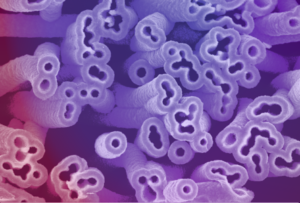Nanoionics, Iontronics and Interfaces
Selected publications:
– Direct measurement of oxygen mass transport at the nanoscale, Advanced Materials (2021) 2105622
– Engineering transport in manganites by tuning local nonstoichiometry in grain boundaries, Advanced Materials 31 (2019) 1805360
– Large-area and adaptable electrospun silicon-based thermoelectric nanomaterials with high energy conversion efficiencies, Nature communications, 9 (2018) 4759

Interfaces often play a crucial role in the overall performance of materials and systems, eventually dominating their behaviour. In particular, interfaces strongly affect transport phenomena such as heat conduction or ion diffusivity. Understanding and controlling these phenomena open a fascinating field of research and application in the energy sector and beyond. ATLAB is dedicated to develop interface-dominated materials for thermoelectric and electrochemical applications.
Regarding heat transport, interface-dominated low-dimensional materials often present a reduced thermal conductivity due to phonon scattering at the nanoscale. This decrease of the thermal diffusivity is decoupled from the electronic condctivity, therefore improving the thermoelectric properties. In our lab, we develop low-cost silicon-based nanostructures with enhanced thermoelectric performance.
Regarding ion diffusivity, mass transport at the nanoscale and along/across interfaces represent a potential field of enhancement of current materials and devices. Indeed, Nanoionics or Iontronics are emerging disciplines created for covering these novel phenomena. ATLAB is dedicated to develop new Nanoionics and Iontronics concepts and their implementation in disruptive devices for applications in energy (solid oxide cells and all-solid-state batteries) and beyond (synaptic transistors).